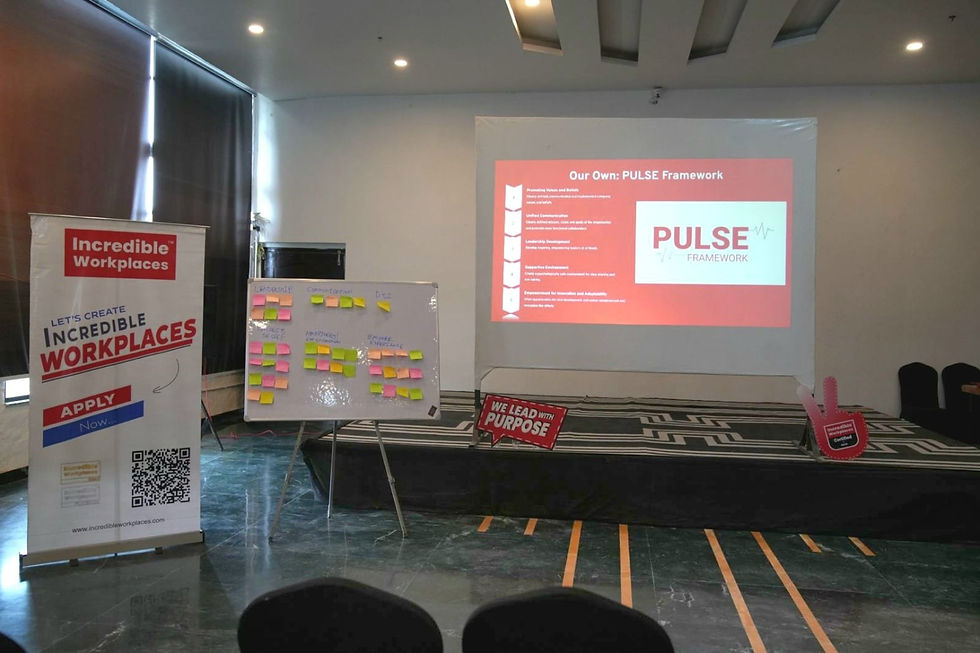Top Culture Metrics HR Leaders Want to Measure: Insights from the Incredible Workplaces (™) Roundtable
- Akash Singh
- Jul 15, 2025
- 3 min read
Updated: Jul 17, 2025

In today’s dynamic work environment, culture isn’t just a buzzword — it’s a strategic driver. But how do you measure something as intangible as culture? That’s the question we posed to 20 experienced HR leaders during a recent roundtable hosted by Incredible Workplaces (™) hosted in Jim Corbett, Uttarakhand, India.
What followed was a rich exchange of ideas captured on colourful sticky notes, clustered into key themes. The responses offer a valuable peek into what truly matters when it comes to tracking and nurturing organizational culture.
Here are the top culture metrics HR leaders say they want to measure:
1. Leadership: The Culture Catalysts
Leadership came up as a dominant theme, with many participants expressing a desire to measure:
Leadership behaviour and alignment with values
Trust in leadership
Leadership approachability and empathy
Decision-making transparency
Managerial support for innovation and feedback
A strong culture starts at the top. HR leaders believe that measuring how leaders role-model values and empower their teams is critical to sustaining a healthy workplace environment.
“People don't leave companies; they leave managers” — this old adage echoes in the insights shared under this theme.
2. Communication: The Culture Connector
Culture thrives on clarity, and communication is its backbone. Sticky notes under this category emphasized:
Effectiveness of internal communication
Frequency and clarity of leadership communication
Two-way feedback mechanisms
Channels for employee voice
HR leaders want to measure how well information flows across levels and how safe employees feel to speak up — a foundational aspect of psychological safety.
3. Employee Engagement & Happiness: The Emotional Pulse

Culture can’t be truly healthy unless people are emotionally invested. Under this theme, sticky notes highlighted:
Happiness Index
Employee motivation levels
Recognition and appreciation frequency
Sense of belonging and connection
Team collaboration and bonding
Many HR leaders said they would love to have a way to quantify how happy and engaged employees are — because engagement leads to performance, and happiness leads to retention.
4. Values & Beliefs: The Cultural Compass
This category revealed a deeper desire to anchor measurement in values:
Alignment of employee behavior with company values
Trust and integrity
Respect and inclusivity
Ownership and accountability
Purpose-driven work
When values are not just framed on walls but are reflected in daily actions, culture becomes real. HR leaders believe that values should be lived and measured.
5. Employee Experience: The Culture Touchpoint
A modern approach to culture requires zooming into every touchpoint of the employee journey, from onboarding to exit. Metrics mentioned here include:
Employee Net Promoter Score (eNPS)
Onboarding experience
Growth opportunities and career conversations
Well-being and work-life balance
Exit feedback themes
The message is clear: Culture is not what happens at offsites — it’s what happens every day. Every interaction matters, and leaders want to track how those experiences feel to employees.
6. Diversity & Inclusion: The Foundational Layer
Although fewer in number, some sticky notes emphasized:
Inclusivity metrics
Sense of fairness
Representation across levels
It’s not enough to recruit diverse talent — HR leaders want to know whether they are creating a workplace where everyone feels they belong.
Final Thoughts: Turning Sticky Notes into Strategy

This roundtable didn’t just produce colorful insights — it revealed a shared aspiration among HR leaders: to build cultures that are intentional, inclusive, and inspiring.
As organizations move beyond superficial perks to create real value for employees, the need to measure the invisible becomes even more important.
At Incredible Workplaces (™), we believe the future of work belongs to organizations that treat culture as both art and science. By defining the right metrics, leaders can turn culture from a feeling into a force.
What do you measure to assess your workplace culture? We’d love to hear your thoughts — drop us a note or join our next roundtable.
Our Speaker -
𝐌𝐫. Abhishek Singh | 𝐌𝐫. Anirban Das | 𝐌𝐫. Ankit Tuli | 𝐌𝐫. Ashwani Chopra | 𝐌𝐫. Atish Bhattacharya | 𝐌𝐫. Mayank Misra | 𝐌𝐫. Rahul Verma | 𝐌𝐫. Rajiv Kumar | 𝐌𝐫. Sachin Tiwari | 𝐌𝐬. Sukhbir Ahluwalia | 𝐌𝐫. Surakshit Khullar | 𝐌𝐫. Tabrez Khan | 𝐌𝐫. Harsh Raj Jain | 𝐌𝐫. Sandeep Bist | 𝐌𝐫. Devender Sharma | 𝐌𝐫. Manash Kumar Bhattacharyy




Comments